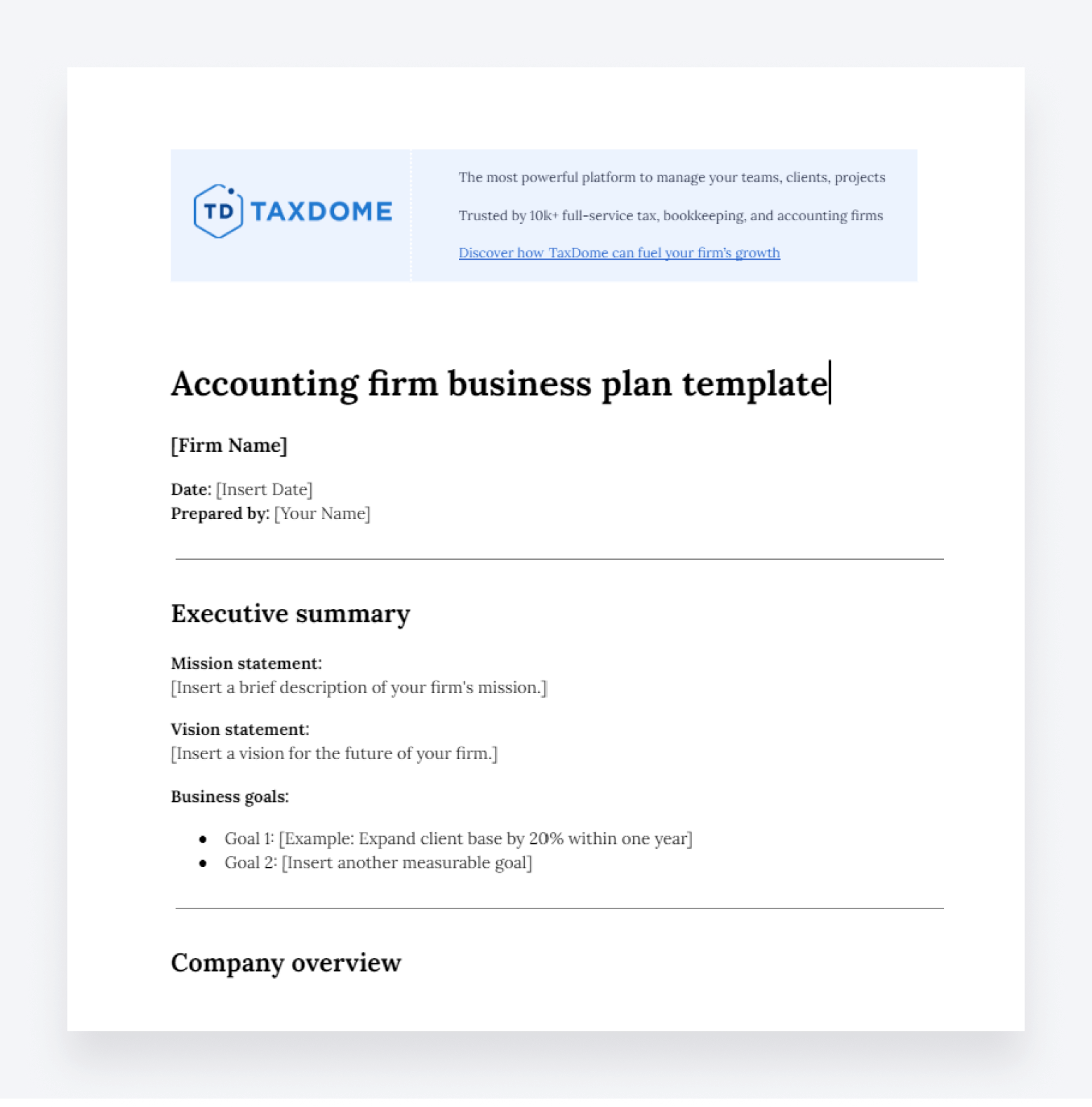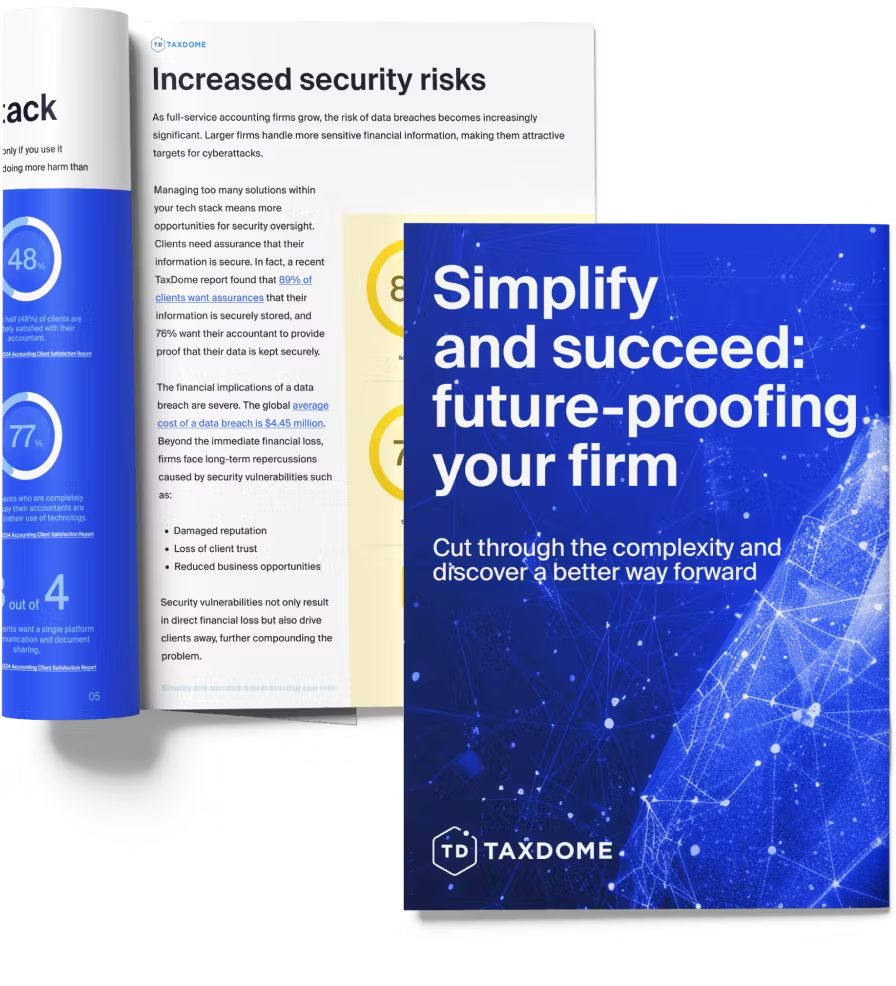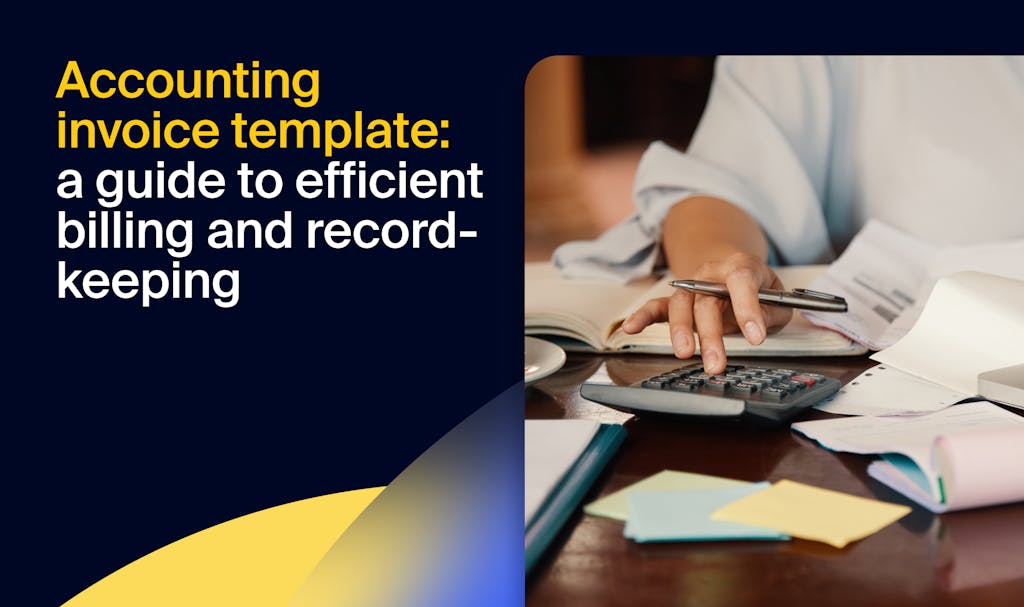
In the day-to-day whirlwind of running an accounting business, it can be easy to lose track of the bigger picture. Where is your business heading? What goals do you have for growth? And how do you plan to achieve them? The best way to answer these questions and stay on track is through a business plan.
A well-structured business plan serves as a roadmap for your accounting firm. It guides your efforts towards overarching goals, ensuring that you understand where you are heading, why, and how you’ll get there.
In this article, we’ll highlight the importance of creating an accounting firm business plan and what it should contain. To save you time, we’ll also give you access to a free business plan template that you can download and customize.
Why your accounting firm needs a business plan
Strategic planning is essential for long-term growth and success. In an increasingly competitive market, accounting firms that have a clear plan will outperform those that don’t. Let’s illustrate this with a simple analogy.
Say you are going on holiday tomorrow. Chances are, you have a plan for how you’ll get to the airport and where you’ll stay. You’ll also have an idea of how much the trip will cost, enabling you to properly budget. You’ll have made a list of things you need to pack, so you don’t get caught short. You will also have researched the place you are visiting to create an itinerary of attractions you’d like to visit.
Now imagine the same trip without any of that planning. You’d spend most of the time reacting to issues caused by your lack of foresight. The holiday would be chaotic at best and disastrous at worst.
This is why a business plan is so important for accounting firms. It helps you anticipate issues, set goals, and enjoy sustainable success. Here’s how author and startup founder Evan Carmichael described it in a recent LinkedIn post:
A business plan isn’t just a document — it’s the foundation of your business’s success. It’s where your vision becomes actionable, where your strategy is born, and where you map out the path to your ultimate goals. It defines why your business exists, what you’re going to offer, who your audience is, and how you’ll turn your ideas into a thriving company. Think of it as your entrepreneurial GPS: it keeps you on track, helps you avoid wrong turns, and ensures you’re headed in the right direction.
Creating a detailed business plan can bring multiple benefits to your business, enabling you to:
- Provide clear direction and goals
- Drive growth and profitability
- Attract clients and investors
- Manage resources effectively
- Measure progress and performance
The importance of effective implementation
Strategic planning is one thing, but successful implementation is another altogether. A recent survey found that almost half of businesses fail to fulfill their plans from the previous year. There are all sorts of reasons why this is the case — from overly ambitious targets to operational inefficiencies.
So how do you ensure that your business plan comes to fruition? For accounting firms, one of the biggest factors in driving success and growth is using the right technology. The best firms streamline and automate their accounting workflows using practice management software such as TaxDome.

TaxDome transforms the way accounting firms operate, providing a central hub for managing clients, teams, projects, documents, and more. It enables forward-thinking firms to scale their operations seamlessly without investing heavily in recruitment.
Take Pharma Tax, for example. Using TaxDome, its team of 13 tripled its revenue and reduced time spent on bookkeeping tasks by up to 73% by consolidating its accounting tech stack and processes into one powerful platform.
You can read the full Pharma Tax story here >What should an accounting firm business plan contain?
As a roadmap for growth and success, your business plan should contain detailed information about your business, the market you operate in, and your strategies for success. In this section, we’ll highlight the key elements you should include.
Executive summary
The executive summary should be a high-level overview of your accounting business. It should contain these elements:
A mission statement
This is a brief declaration of the core purpose of your business. In other words, it describes why your business exists, what it does, and whom it serves.
Example:
- Our mission is to deliver market-leading, personalized accounting services that help businesses and individuals achieve financial clarity and success.
Your vision for the future
Here, you should set out your corporate vision. This is the grand plan for what you want your business to achieve in the future. Your vision will help shape your objectives.
Example:
- Our vision is to become the leading firm for small businesses in our region, known for innovative solutions, exceptional client service, and helping clients achieve lasting financial growth.
Your main objectives
These are the goals you want to achieve in pursuing your vision. They could relate to the size of your firm, client base, revenue, or reputation. The aim here is to provide investors, partners, staff, or other key stakeholders with measurable objectives that can be used to understand future success.
Examples:
- Increase client base by 20% in the next 12 months
- Achieve a 95% client retention rate
- Expand services to include financial advisory by year-end
- Build a strong online presence and increase website traffic by 30%
- Hire two additional accountants to support a growing client demand
Whatever objectives you choose, make sure they are realistic. Claiming you’ll turn a new firm into a multistate enterprise in a few years is wishful thinking — and savvy stakeholders will know this. Forty-eight percent of all organizations fail to meet at least half of their strategic targets, likely due to overstated ambitions or poor implementation. The key, then, is to set targets that are motivational and ambitious yet achievable.
A description of your firm
In this section, you can provide a more detailed description of your accounting business. Include key information such as:
- Your legal structure (e.g. LLC, partnership, or corporation)
- Where you are based and what state your business is registered or incorporated in
- The focus of your business and the services you offer
- Any unique selling points you have
Market analysis
This section is all about understanding the broader market and how you want to position your firm within it. Conduct thorough market research, including detailed descriptions of:
- Your target market and ideal client, including demographics, needs, and goals
- Industry trends and how you can capitalize on them to drive growth and profitability
- Who your direct competitors are — what they’re doing well and where you can outmaneuver them
Organization and management
Outline the organizational structure of your business. This should include business ownership and leadership, key roles and responsibilities, and relevant experience. You should also explain how the business’s reporting structure works. If possible, include an organization chart that shows how levels of seniority and chains of command work.
Services and pricing strategy
In this section, you can outline the services you plan to offer in detail. You should also explain your pricing strategy. How you price your services will have a direct impact on client acquisition as well as your revenue and profit, so it’s important to answer questions such as:
- Will you charge per hour or use fixed rates for different services?
- Why have you chosen these pricing models?
- How does your service offering and pricing compare to direct competitors?
Marketing strategy
In this section, you describe how you plan to attract and retain clients. Provide detailed information on:
- Your broader marketing strategy — who you plan to target and how
- The channels you will use — e.g. SEO, social media, content marketing, referrals, networking, or email campaigns
- The technology and software you will use to attract and convert clients — marketing automation software, content management systems, CRMs, etc.
- How you plan to retain clients once you’ve onboarded them
Financial projections
Finally, your accounting firm business plan should include some financial projections for the next one to five years, including:
- Revenue projections
- Profit margins
- Cash flow projections
These projections serve as a goal to aim towards and a benchmark to measure success against. They also help potential investors and partners understand the potential your business has for growth.
Free accounting firm business plan template
To speed up the process of writing your business plan, we’ve created a free template you can use. Simply click on the link below, copy and paste the content into a new document, and customize the template to suit your needs.
You can add all relevant information in the placeholders and add, remove, or modify any sections as you see fit.
Download our free accounting firm business plan template
To sum up
A well-structured business plan is essential for the long-term success and growth of your accounting firm. It provides a clear roadmap, helping you to clarify who you are as a business, where you want to be, and how you plan to get there. In a highly competitive market, firms that think strategically will outperform those that don’t.
Writing an accounting firm business plan from scratch can be time-consuming. To speed up the process, we encourage you to use the template we’ve provided in this guide. And remember — to achieve your accounting firm goals, you need the right technology.
TaxDome provides all the tools you need to run a highly efficient and profitable accounting business. From workflow automation to seamless client interactions, team collaboration, and document management, it’s the central hub for all your firm’s processes.
To see how TaxDome users save up to 40 hours per employee per month, request a demo today.

Thank you! The eBook has been sent to your email. Enjoy your copy.
There was an error processing your request. Please try again later.
What makes the best accounting firms thrive while others struggle to keep up? We analyzed our top 20 TaxDome firms, representing over $100M in combined revenue, to uncover the strategies driving their success.



